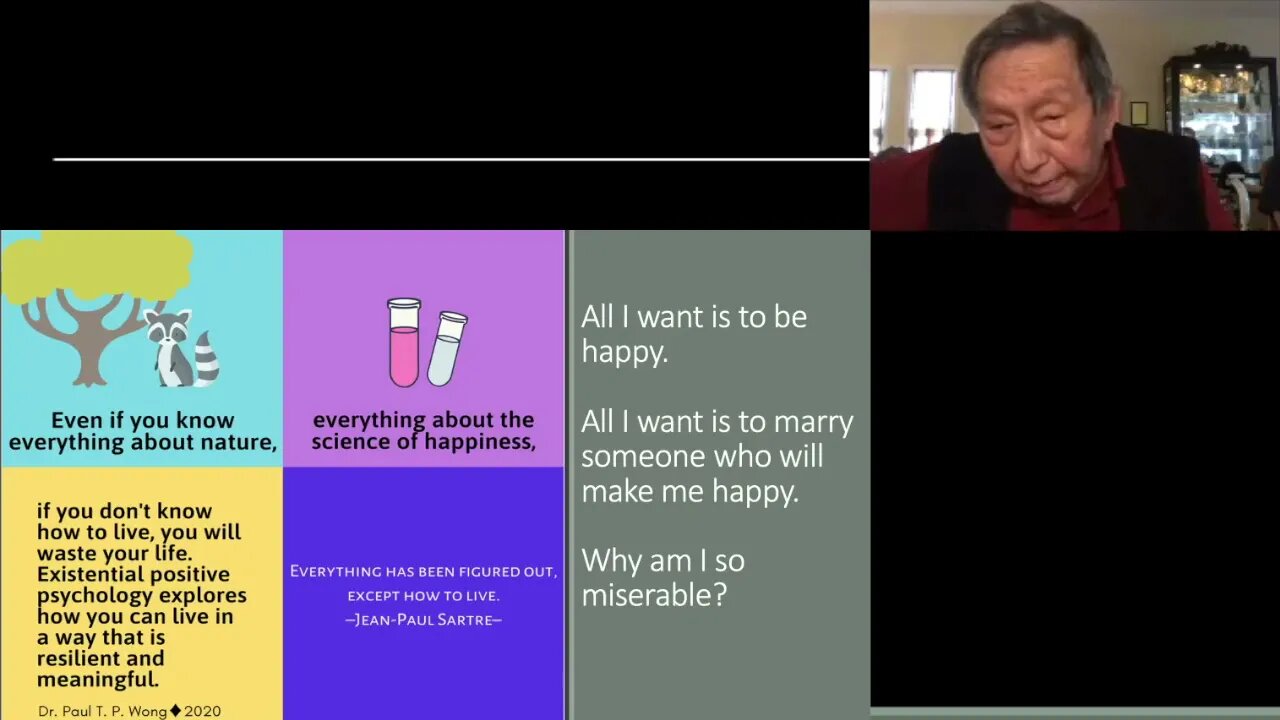Premium Only Content

The Surprising New Science of Suffering: What is Suffering? How Can We Turn it into Flourishing?
Dr. Paul T. P. Wong introduces his studies in suffering and explains how to transform suffering into flourishing. Presented virtually at the Human Flourishing Program, Harvard university
I need your support for this new institute dedicated to the new science of suffering and flourishing: https://www.meaning.ca/positive-psychology/rifs/
Don't forget to like and subscribe! Click the bell icon to be notified of the next video!
Join our free newsletter: https://www.meaning.ca/#mc4wp-form-1
Want to learn more? Check out INPM: https://www.meaning.ca/
Check up my website: http://www.drpaulwong.com/
Tip Dr. Paul T. P. Wong:
https://www.subscribestar.com/dr-paul-t-p-wong
Donate to INPM
PayPal Giving Fund: https://www.paypal.com/ca/fundraiser/charity/3440157
References
Arslan, G. & Wong, P. T. P. (2022). Measuring Personal and Social Responsibility: An Existential Positive Psychology Approach. Journal of Happiness and Health, 2(1), 1-11. https://doi.org/10.47602/johah.v2i1.5
Ho, S., Cook, K. V., Chen, Z. J., Kurniati, N. M. T., Suwartono, C., Widyarini, N., Wong, P. T. P., & Cowden, R. G. (under review). Suffering, psychological distress, and well-being in Indonesia: A prospective cohort study. Journal of Happiness and Health.
VanderWeele T. J. (2019). Suffering and response: Directions in empirical research. Social science & medicine (1982), 224, 58–66. https://doi.org/10.1016/j.socscimed.2019.01.041
Wong, P. T. P. (1971). Coerced approach to shock, punishment of competing responses and resistance to extinction in the rat. Journal of Comparative and Physiological Psychology, 76, 275-281.
Wong, P. T. P. (1979). Frustration, exploration, and learning. Canadian Psychological Review, 20, 133-144.
Wong, P. T. P. (1993). Effective management of life stress: The resource-congruence model. Stress Medicine, 9(1), 51-60.
Wong, P. T. P. (1995). A stage model of coping with frustrative stress. In R. Wong (Ed.), Biological perspectives on motivated activities (pp. 339–378). Ablex Publishing Corporation.
Wong, P. T. P. (2011). Positive psychology 2.0: Towards a balanced interactive model of the good life. Canadian Psychology/Psychologie canadienne, 52(2), 69–81. https://doi.org/10.1037/a0022511
Wong, P. T. P. (2012a). Toward a dual-systems model of what makes life worth living. In P. T. P. Wong (Ed.), The human quest for meaning: Theories, research, and applications (2nd ed., pp. 3-22). Routledge.
Wong, P. T. P. (Ed.) (2012b). The Human Quest for Meaning: Theories, Research, and Applications. Routledge.
Wong, P. T. P. (2016). Meaning-seeking, self-transcendence, and well-being. In A. Batthyany (Ed.), Logotherapy and existential analysis: Proceedings of the Viktor Frankl Institute (Vol. 1; pp. 311-322). Springer.
Wong, P. T. P. (2020a). Existential Positive Psychology and Integrative Meaning Therapy. International Review of Psychiatry. Doi:10.1080/09540261.2020.1814703
Wong, P. T. P. (2020b). Made for Resilience and Happiness: Effective Coping with COVID-19 According to Viktor E. Frankl and Paul T. P. Wong. INPM Press.
Wong, P. T. P. (2021). The Frankl cure for the 21st century: Why self-transcendence is the key to mental health and flourishing. The International Forum for Logotherapy, 41(2), 33-50. Doi:10.31234/osf.io/tbx3f
Wong, P. T. P., & Bowers, V. (2018). Mature happiness and global wellbeing in difficult times. In N. R. Silton (Ed.), Scientific concepts behind happiness, kindness, and empathy in contemporary society. IGI Global.
Wong, P. T. P., & Watt, L. (1991). What types of reminiscence are associated with successful aging? Psychology and Aging, 6(2), 272-279.
Wong, P. T. P., & Yu, T. T. F. (2021). Existential suffering in palliative care: An existential positive psychology perspective. Medicina, 57(9), 924. https://doi.org/10.3390/medicina57090924
Wong, P. T. P., Arslan, G., Bowers, V. L., Peacock, E. J., Kjell, O. N. E., Ivtzan, I., Lomas, T. (2021). Self-transcendence as a buffer against COVID-19 suffering: The development and validation of the Self-Transcendence measure-B. Frontiers, 12, 4229. https://doi.org/10.3389/fpsyg.2021.648549
Wong, P. T. P., Reker, G. T. & Peacock, E. (2006). The resource-congruence model of coping and the development of the Coping Schemas Inventory. In P. T. P. Wong, & L. C. J., Wong (Eds.), Handbook of multicultural perspectives on stress and coping (pp. 223-283). Springer.
Follow me on social media:
Facebook - https://www.facebook.com/PaulTPWong
Twitter - https://twitter.com/PaulTPWong
Instagram - https://www.instagram.com/drpaultpwong/
Reddit - https://www.reddit.com/user/DrPTPWong
More about Dr. Paul T. P. Wong here: http://www.drpaulwong.com/curriculum-vitae/
LinkedIn - https://www.linkedin.com/in/paul-tp-wong-phd-c-psych-3ba2a04/
The mission of the International Network on Personal Meaning is to advance the vision of Dr. Viktor Frankl and Dr. Paul T. P. Wong through meaning research, meaning-centered practice, and meaningful living groups.
-

sophiesnazz
4 hours agoLETS TALK ABOUT BO7 !socials !specs
3.18K -
 1:27:30
1:27:30
Redacted News
3 hours ago"There will be consequences!!!" Trump issues big threat to Putin ahead of peace summit | Redacted
86.8K138 -
 LIVE
LIVE
Amish Zaku
2 hours agoWar Thunder - Tank Tuesday
126 watching -
 1:27:05
1:27:05
Kim Iversen
3 hours agoIsrael DEMANDS X Remove Posts and X COMPLIES | Socialist Groceries Coming To A Store Near You!
40.9K71 -
 1:11:53
1:11:53
vivafrei
10 hours agoThe Great Replacement of American Truckers With Unskilled Foreign Labor - Live with Gord Magill
93.5K63 -
 1:05:13
1:05:13
Sarah Westall
3 hours agoEU Falling, United States Barely Hanging on - Strength and Courage Needed to Fight for Free Speech
39.1K3 -
 LIVE
LIVE
LFA TV
12 hours agoLFA TV ALL DAY STREAM - TUESDAY 8/19/25
842 watching -
 2:11:18
2:11:18
The Quartering
5 hours agoToday's Breaking News! Disgusting Grocery Shopping "Haul" Goes Viral, Las Vegas Collapse & More
100K34 -
 5:43:27
5:43:27
StoneMountain64
6 hours agoBest Extraction shooter is FINALLY on Console (+CoD Reveal Today)
59.8K -
 3:04:51
3:04:51
Due Dissidence
8 hours agoZelensky RETURNS To DC, HUGE Protests In Israel, Gal Gadot Blames Palestine For Flop, MSNBC Rebrands
49.6K22